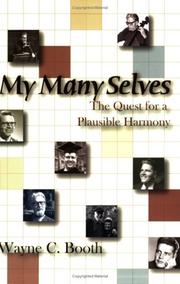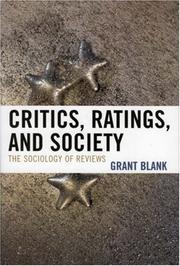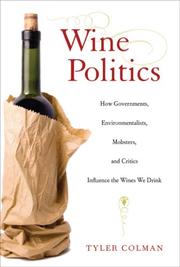| Listing 1 - 10 of 14 | << page >> |
Sort by
|

ISBN: 1283283484 9786613283481 0874215358 0874216311 0874216338 9780874215359 9780874216318 9780874216332 9781283283489 Year: 2006 Publisher: Logan, Utah Utah State University Press
Abstract | Keywords | Export | Availability | Bookmark
 Loading...
Loading...Choose an application
- Reference Manager
- EndNote
- RefWorks (Direct export to RefWorks)
In his autobiography, My Many Selves, Wayne C. Booth is less concerned with his professional achievements---though the book by no means ignores his distinguished career---than with the personal vision that emerges from a long life lived thoughtfully. For Booth, even the autobiographical process becomes part of a quest to harmonize the diverse, often conflicting aspects of who he was. To see himself clearly and whole, he broke the self down, personified the fragments, uncovered their roots in his experience and background, and engaged those selves and experiences in dialogue. Basic to
Book
ISBN: 9048526736 9089648259 Year: 2017 Publisher: Amsterdam : Amsterdam University Press,
Abstract | Keywords | Export | Availability | Bookmark
 Loading...
Loading...Choose an application
- Reference Manager
- EndNote
- RefWorks (Direct export to RefWorks)
"From 1968 to 1991 the acclaimed film theorist Christian Metz wrote several remarkable books on film theory. These books set the agenda of academic film studies during its formative period. Metz's ideas were taken up, digested, refined, reinterpreted, criticized and sometimes dismissed, but rarely ignored. This volume collects and translates into English a series of interviews with Metz, who offers readable summaries, elaborations, and explanations of his sometimes complex and demanding theories of film. We also discover the contents of his unpublished manuscript on jokes, his relation to Roland Barthes, and the social networks operative in the French intellectual community during the 1970s and 1980s."--Back cover.
Film criticism. --- Motion picture criticism --- Motion pictures --- Moving-picture criticism --- Criticism --- Evaluation --- Metz, Christian, --- Filmtheorie --- Film critics. --- Film critics --- Philosophy. --- Metz, Christian --- Motion picture critics --- Moving-picture critics --- Critics --- Film Theory, Semiotics, Psychoanalysis, Christian Metz.
Book
ISBN: 023153714X 0231165781 1322374252 9780231537148 9780231165785 Year: 2014 Publisher: New York, NY
Abstract | Keywords | Export | Availability | Bookmark
 Loading...
Loading...Choose an application
- Reference Manager
- EndNote
- RefWorks (Direct export to RefWorks)
Iris Barry (1895-1969) was a pivotal modern figure and one of the first intellectuals to treat film as an art form, appreciating its far-reaching, transformative power. Although she had the bearing of an aristocrat, she was the self-educated daughter of a brass founder and a palm-reader from the Isle of Man. An aspiring poet, Barry attracted the attention of Ezra Pound and joined a demimonde of Bloomsbury figures, including Ford Maddox Ford, T. S. Eliot, Arthur Waley, Edith Sitwell, and William Butler Yeats. She fell in love with Pound's eccentric fellow Vorticist, Wyndham Lewis, and had two children by him. In London, Barry pursued a career as a novelist, biographer, and critic of motion pictures. In America, she joined the modernist Askew Salon, where she met Alfred Barr, director of the new Museum of Modern Art. There she founded the museum's film department and became its first curator, assuring film's critical legitimacy. She convinced powerful Hollywood figures to submit their work for exhibition, creating a new respect for film and prompting the founding of the International Federation of Film Archives. Barry continued to augment MoMA's film library until World War II, when she joined the Office of Strategic Services to develop pro-American films with Orson Welles, Walt Disney, John Huston, and Frank Capra. Yet despite her patriotic efforts, Barry's "foreignness" and association with such filmmakers as Luis Buñuel made her the target of an anticommunist witch hunt. She eventually left for France and died in obscurity. Drawing on letters, memorabilia, and other documentary sources, Robert Sitton reconstructs Barry's phenomenal life and work while recasting the political involvement of artistic institutions in the twentieth century.
Archivists --- Film critics --- Motion picture film --- Motion picture film collections --- Music, Dance, Drama & Film --- Film --- Preservation --- History --- Archival resources --- Barry, Iris, --- Museum of Modern Art (New York, N.Y.). --- History. --- Archival resources. --- Film collections --- Film libraries --- Motion picture collections --- Motion picture libraries --- Moving-picture film collections --- Cinematographic film --- Film, Cinematographic --- Film, Motion picture --- Films, Cinematographic --- Motion pictures --- Moving-picture film --- Motion picture critics --- Moving-picture critics --- Museum of Modern Art Film Library (New York, N.Y.) --- Film Library of the Museum of Modern Art (New York, N.Y.) --- Special libraries --- Film archives --- Cinematography --- Photography --- Critics --- Equipment and supplies --- Films --- Preservation&delete& --- E-books
Book
ISBN: 1477308415 Year: 2016 Publisher: Austin : University of Texas Press,
Abstract | Keywords | Export | Availability | Bookmark
 Loading...
Loading...Choose an application
- Reference Manager
- EndNote
- RefWorks (Direct export to RefWorks)
Shortly after the turn of the twentieth century, the Metropolitan Museum of Art began an ambitious program of collection building and physical expansion that transformed it into one of the world’s foremost museums, an eminence that it has maintained ever since. Two men of singular qualities and accomplishments played key roles in the Met’s transformation—J. P. Morgan, America’s leading financier and a prominent art collector, and Roger Fry, the headstrong English expert in art history who served as the Met’s curator of painting. Their complicated, often contentious relationship embodies and illuminates the myriad tensions between commerce and art, philanthropists and professional staff, that a great museum must negotiate to define and fulfill its mission. In this masterful, multidisciplinary narrative, Charles Molesworth offers the first in-depth look at how Morgan and Fry helped to mold the cultural legacy of masterpieces of painting and the development of the “encyclopedic” museum. Structuring the book as a joint biography, Molesworth describes how Morgan used his vast wealth to bring European art to an American citizenry, while Fry brought high standards of art history from the world of connoisseurs to a general public. Their clashes over the purpose and functions of the Met, which ultimately led to Fry’s ouster, reveal the forces—personal and societal—that helped to shape the Metropolitan Museum and other major American cultural institutions during the twentieth century.
Capitalists and financiers --- Art patrons --- Art --- Art critics --- Collectors and collecting. --- Morgan, J. Pierpont --- Fry, Roger, --- Metropolitan Museum of Art (New York, N.Y.)

ISBN: 9780742575790 0742575799 9780742547032 0742547035 0742547027 1299791700 9780742547025 Year: 2007 Publisher: Lanham, Maryland ; Plymouth, England : Rowman & Littlefield Publishers, Inc.,
Abstract | Keywords | Export | Availability | Bookmark
 Loading...
Loading...Choose an application
- Reference Manager
- EndNote
- RefWorks (Direct export to RefWorks)
Critics, Ratings, and Society is the first comprehensive study of the review as social institution. Its theories and data encompass reviews of all types of products-including the arts (e.g. theater, books, and music) and consumer products (e.g. cars, software, and appliances). According to Blank, the core problem of reviews is credibility. Concerns about credibility organize the formulation of reviews and audiences. The connoisseurial-procedural distinction describes the production of credibility and its assessment under different types of rating systems.
Social choice. --- Criticism --- Consumers --- Critics. --- PSYCHOLOGY --- Beurteilung --- Beurteilung. --- Rezension. --- Restaurant. --- Software. --- Entscheidung. --- Einstellung. --- Verbraucher. --- Soziologie. --- Social aspects. --- Attitudes. --- Social Psychology. --- Meinungsbildung. --- Smith, Glen. --- Psychology --- Social psychology. --- Literary critics --- Consumer attitudes --- Evaluation of literature --- Literary criticism --- Literature --- Choice, Social --- Collective choice --- Public choice --- Technique --- Evaluation --- Litterateurs --- Market surveys --- Consumers' preferences --- Rhetoric --- Aesthetics --- Choice (Psychology) --- Social psychology --- Welfare economics
Book
ISBN: 3839452481 Year: 2022 Publisher: Bielefeld transcript Verlag
Abstract | Keywords | Export | Availability | Bookmark
 Loading...
Loading...Choose an application
- Reference Manager
- EndNote
- RefWorks (Direct export to RefWorks)
Die Berliner Schule gilt als die wichtigste Strömung im deutschen Kino seit den 1970er Jahren. Gleichzeitig kann sie als wesentlicher Teil der globalen New-Wave-Filme verstanden werden, die an den traditionellen Rändern des Weltkinos angesiedelt sind. In 15 Essays setzen die Beiträger*innen des Bandes die Berliner Schule mit Beispielen des globalen Kinos in Verbindung - vom Nahen Osten über Südostasien bis Nordamerika - und laden dazu ein, sie als zentralen Aspekt des Nachwende-Kinos in einem transnationalen Licht zu betrachten. Damit liefern sie zum ersten Mal eine systematische Untersuchung dieser Gattung und stellen sie als eine der wichtigsten Entwicklungen des gegenwärtigen Arthouse-Kinos heraus.
Film; Berliner Schule; Deutsches Kino; Arthouse-Kino; Nachwende-Kino; New Wave; Globales Kino; Gegenwartskino; Filmemacher; Filmtheorie; Filmkritik; Globalisierung; Medienwissenschaft; Berlin School; German Cinema; Post-reunification Cinema; Global Cinema; Contemporary Cinema; Movie Makers; Film Theory; Movie Critics; Globalization; Media Studies --- Berlin School. --- Contemporary Cinema. --- Film Theory. --- German Cinema. --- Global Cinema. --- Globalization. --- Media Studies. --- Movie Critics. --- Movie Makers. --- New Wave. --- Post-reunification Cinema.
Book
ISBN: 1526111160 1526111179 9781526111173 Year: 2013 Publisher: Manchester Manchester University Press
Abstract | Keywords | Export | Availability | Bookmark
 Loading...
Loading...Choose an application
- Reference Manager
- EndNote
- RefWorks (Direct export to RefWorks)
How did advertising shape growing popular prosperity in the 1950s and 60s? What were the images of domesticity and modern living which it promoted? Focusing on advertising's relationship to the mass market housewife, Hard sell shows how advertising promoted new standards of material comfort in the selling of a range of everyday consumer goods and, in the process, generalised a cross-class image of the 'modern housewife' across the new medium of television. Nixon shows how the practices through which British advertising understood and represented the 'modern housewife' and domestic consumption were influenced by American advertising and commercial culture. In drawing out these trans-Atlantic influences, Hard sell challenges the way critics and historians have often understood Anglo-American relations. It shows how American influences across a range of areas of advertising practice, including the development of television advertising, were not only a source of inspiration, but also were adapted and reworked to more effectively speak to the British consumer. Through detailed studies of advertising, the practices of advertising agencies and the public debates that shaped their reception, Hard sell offers a major new analysis of advertising in the decades of post-war affluence and the Anglo-American exchanges that shaped advertising's contribution to this period of social change. It marks a significant contribution to debates within contemporary British history, the sociology of affluence and to studies of consumer and marketing history.
Advertising --- Social aspects --- History --- Americanization. --- Anglo-American relations. --- British advertising. --- J Walter Thompson. --- JWT London. --- TV commercials. --- affluence. --- cultural critics. --- documentary film. --- hard sell advertising. --- market research. --- mass consumption. --- mass housewife. --- television advertising. --- trans-Atlantic relations.
Book
ISBN: 9781477308400 9781477308417 9781477308424 1477308415 1477308423 1477308407 Year: 2016 Publisher: Austin, Tex. University of Texas Press
Abstract | Keywords | Export | Availability | Bookmark
 Loading...
Loading...Choose an application
- Reference Manager
- EndNote
- RefWorks (Direct export to RefWorks)
Shortly after the turn of the twentieth century, the Metropolitan Museum of Art began an ambitious program of collection building and physical expansion that transformed it into one of the world?s foremost museums, an eminence that it has maintained ever since. Two men of singular qualities and accomplishments played key roles in the Met?s transformation?J. P. Morgan, America?s leading financier and a prominent art collector, and Roger Fry, the headstrong English expert in art history who served as the Met?s curator of painting. Their complicated, often contentious relationship embodies and illuminates the myriad tensions between commerce and art, philanthropists and professional staff, that a great museum must negotiate to define and fulfill its mission.
In this masterful, multidisciplinary narrative, Charles Molesworth offers the first in-depth look at how Morgan and Fry helped to mold the cultural legacy of masterpieces of painting and the development of the "encyclopedic" museum. Structuring the book as a joint biography, Molesworth describes how Morgan used his vast wealth to bring European art to an American citizenry, while Fry brought high standards of art history from the world of connoisseurs to a general public. Their clashes over the purpose and functions of the Met, which ultimately led to Fry?s ouster, reveal the forces?personal and societal?that helped to shape the Metropolitan Museum and other major American cultural institutions during the twentieth century.
Museology --- Art --- museology --- art museums [institutions] --- collecting, United States --- curators --- Morgan, John Pierpont --- Fry, Roger Eliot --- Metropolitan Museum of Art [New York, N.Y.] --- Capitalists and financiers --- Art patrons --- Art critics --- Collectors and collecting. --- Morgan, J. Pierpont --- Fry, Roger, --- Metropolitan Museum of Art (New York, N.Y.) --- United States --- England
Book
ISBN: 0520298659 0520970705 9780520970700 Year: 2019 Publisher: Oakland, California : University of California Press,
Abstract | Keywords | Export | Availability | Bookmark
 Loading...
Loading...Choose an application
- Reference Manager
- EndNote
- RefWorks (Direct export to RefWorks)
"At publication date, a free ebook version of this title will be available through Luminos, University of California Press's Open Access publishing program. Visit www.luminosoa.org to learn more. This provocative study is situated at the intersection of the history, historiography, and aesthetics of twentieth-century music. It uses Benjamin Britten's operas to illustrate the ways in which composers, critics, and audiences mediated the 'great divide' between modernism and mass culture. Reviving midcentury discussions of the 'middlebrow,' Christopher Chowrimootoo demonstrates how these works allowed audiences to have their modernist cake and eat it too: to revel in the pleasures of consonance, lyricism, and theatrical spectacle even while enjoying the prestige that came from rejecting them. By focusing on key moments when reigning aesthetic oppositions and hierarchies threatened to collapse, Middlebrow Modernism offers a powerful model for recovering shades of gray in the previously black-and-white historiographies of twentieth-century music"--Provided by publisher.
Music --- Opera --- Modernism (Music) --- History --- Philosophy and aesthetics. --- Britten, Benjamin, --- Modernism in music --- Modernist music --- Musical modernism --- Style, Musical --- 20th century music. --- aesthetic oppositions. --- aesthetics. --- audiences. --- benjamin britten. --- composers. --- consonance. --- critics. --- cultural hierarchies. --- great divide. --- historiography. --- lyricism. --- mass culture. --- mid century discussions. --- modernism. --- music history and criticism. --- music history. --- music. --- opera music. --- opera. --- prestige. --- shades of grey. --- theatrical spectacle. --- Philosophy and esthetics. --- Art music --- Art music, Western --- Classical music --- Musical compositions --- Musical works --- Serious music --- Western art music --- Western music (Western countries)

ISBN: 0520255216 1435684788 9786611752682 1281752681 0520934733 9780520934733 9781281752680 9780520255210 9781435684782 6611752684 Year: 2008 Publisher: Berkeley University of California Press
Abstract | Keywords | Export | Availability | Bookmark
 Loading...
Loading...Choose an application
- Reference Manager
- EndNote
- RefWorks (Direct export to RefWorks)
After reading this intriguing book, a glass of wine will be more than hints of blackberries or truffles on the palate. Written by the author of the popular, award-winning website DrVino.com, Wine Politics exposes a little-known but extremely influential aspect of the wine business-the politics behind it. Tyler Colman systematically explains how politics affects what we can buy, how much it costs, how it tastes, what appears on labels, and more. He offers an insightful comparative view of wine-making in Napa and Bordeaux, tracing the different paths American and French wines take as they travel from vineyard to dining room table. Colman also explores globalization in the wine business and illuminates the role of behind-the-scenes players such as governments, distributors, and prominent critics who wield enormous clout. Throughout, Wine Politics reveals just how deeply politics matters- right down to the taste of the wine in your glass tonight.
Wine - Political aspects. --- Wine and wine making -- Political aspects. --- Wine and wine making. --- Wine industry. --- Wine --- Wine industry --- Industries --- Business & Economics --- Political aspects --- Political aspects. --- Alcoholic beverage industry --- american wines. --- behind the scenes. --- big business. --- bordeaux. --- burgundy. --- business and industry. --- business politics. --- california. --- cost of wine. --- europe. --- food politics. --- france. --- french wines. --- globalization. --- government influence. --- history of wine. --- inside perspective. --- napa. --- nonfiction. --- oregon. --- vineyards. --- wine business. --- wine critics. --- wine culture. --- wine distributors. --- wine historians. --- wine industry. --- wine labels. --- wine laws. --- wine lovers. --- wine making. --- wine taste. --- wine tasting. --- wine.
| Listing 1 - 10 of 14 | << page >> |
Sort by
|

 Search
Search Feedback
Feedback About UniCat
About UniCat  Help
Help News
News